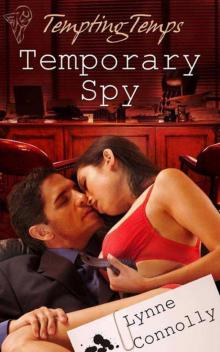- Home
- Lynne Connolly
Lisbon: Richard and Rose, Book 8 Page 2
Lisbon: Richard and Rose, Book 8 Read online
Page 2
The pilot bowed low but straightened and held up his chin. For that alone, I liked him. Richard hadn’t dressed like this for him, an honest man doing an honest job, but the threatened officials, who arrived in the pilot’s wake. They crowded on deck with their entourage, and chaos ensued, the noise from many feet shuffling on the wood and the conversation, jabbering in a language I barely understood, shattering the relative tranquillity that we’d had before their arrival.
Richard moved to stand in front of me, partially blocking me from their view and impeding their access. He glanced at Carier, who went to the captain and said something. The captain nodded and gestured to his men, who came forwards and effectively boxed in our visitors. We had thought our yacht spacious, but it didn’t appear so now.
They wanted to see the English gentleman. Perhaps Richard’s reputation had gone before him, or maybe the magnificence of the vessel sailing into the harbour had aroused their curiosity, but I was sure most of the people had no right or reason to be here.
I felt severely underdressed when the port officials extricated themselves from the mob and came forwards to stand before us. One in particular wore garments that rivalled my husband’s, although to my prejudiced eyes, neither so well fitting nor so beautiful, and not embellished with a coat of arms. However, his cocked hat bore braid and badges, but whether some kind of badge of office or the fashion of Portugal, I had no idea.
Another wore the sober black garb of the priest, his only adornment the heavy silver crucifix around his neck. His flat, broad-brimmed hat sat completely straight on his head, like one of those china figures used for snuffing candles, the resemblance more noted by the way he had his hands folded neatly before him. Another man, the one who spoke English best, as it turned out, dressed in what looked to me like ordinary day wear, neat but unremarkable. They all seemed to have at least three assistants or followers, though that could hardly be the case, although they milled around so much it appeared that way.
These men spoke English, one fluently, the rest in a variation that sounded charming but that I found almost incomprehensible. I spoke French and Italian well, but not Portuguese and certainly not this version of English. They barely spared me a glance as they goggled at Richard before bowing low.
For one moment I thought he’d present them with one of the graceful, mocking bows London knew him for. Richard was greatly renowned for his bows, the depths of which he calculated to a nicety. If he gave someone a bow far too deep, he was mocking them, and they often knew it. As we didn’t know the intricacies of Portuguese behaviour, we couldn’t be sure that they wouldn’t take one of Richard’s low bows seriously, and I guessed that was why he kept his response to a curt nod.
The plainly dressed man spoke. “My lord, my lady, I have pleasure in introducing to you Señor Antonio Alvares, our esteemed Magistrate of Health.”
Richard raised a brow. “We have no sickness on board to my knowledge. We are all in positively rude health.” He did not reveal the wave of sickness many of the crew had suffered since it had passed and would only have delayed us now.
The man relayed the fact to his compatriots and received a string of instructions in return.
Richard spoke perfect Spanish and could probably work out most of what they were saying, although Portuguese had a different cadence to my ears. Less musical than the liquidity of Spanish, but attractive. I couldn’t understand a word, but I employed my time listening to the rhythms and imagining how it would translate into bars and staves.
Richard remained silent, his chin up, his eyes half-lidded and his mouth firm and severely straight.
The interpreter gave us a sketchy bow and an apology. “The magistrate says that everyone must appear on deck.”
I glanced around, and a bright head of fair hair on one of the visitors caught my attention, though by the time I returned for a closer look, it was gone. I shivered.
Richard, being Richard, noticed at once and bent to me. “You are tired?”
“Not at all. I just saw something that recalled another time to mind. I’m fine, truly.”
The sight had brought back what we’d left behind, and what we’d been forced to do to ensure our safety and that of our children. I would not let such memories affect how I behaved now. Dead people could not hurt me, nor could people half a world away.
Chapter Two
Señor Alvares refused to budge on his decision to gather everyone on deck, even though Richard stared him down. Any longer and we’d all freeze from the fresh wind whipping up.
“You wish to disturb our children?” Richard asked the inspector, his voice positively arctic. “You wish me to produce my children like a man parading his stock before a buyer? You are doomed to disappointment, sir.”
The official spoke, and our interpreter reddened. “It will be sufficient if you allow Señor Alvarez and myself to see the children. We will go to them, he says.”
“If you absolutely must, then that is the only way you will see them.”
Richard lifted his hand. The lace fell back from his wrist as Richard gave a signal to Carier, who nodded and hurried below, ignoring the officials intending to block his presence. When the magistrate opened his mouth to protest, Richard shot him a warning glance that made him close his mouth, his words remaining unspoken.
“Only you two gentlemen. You understand? Then you all leave.”
The magistrate bowed, flourishing his hat in what I would have considered far too deep an obeisance. Probably an insult, though I couldn’t be sure. I’d have to ask Lizzie about the customs here.
The Magistrate of Health strolled down the deck, the crew parting before him like one of the gentle waves supporting our vessel. An uneasy silence settled on the men.
The pompous man sauntered around, occasionally pausing to take a man’s hand and feel his wrist, perfunctorily doing his job. No doubt he had other tasks, like reporting back to his masters that we had the bare minimum of weapons—not counting the ones the captain kept hidden behind the boards on the lower deck, which the magistrate would not know about—and that a great lord and his family had sailed into port.
The news would be all around Lisbon by nightfall. I hoped we could be well away from the shore by then, although I didn’t know Lizzie’s plans for us in any detail.
Her husband, the Marquês de Aljubarrotta, owned a plethora of names, but we had learned to call him Paul. His English mother had retired to her native country after she was widowed, and that had ensured his visits to our homeland, where he’d met my sister and fallen in love during the course of a season. The happiness in her marriage was a constant delight to me, but I missed her very much. We exchanged letters as frequently as we could, but we hadn’t met since the birth of her son. Or of my babies. She sent me letters full of laughter and smiles, letters that went a long way towards buoying my spirits after my illness.
This delay to our reunion irked me. For all I knew, Lizzie waited for us on the shore, and I was so close to seeing her that had I a spyglass handy, I could have used it to search for her. Or she might have sent a coach.
Weariness swept over me in an all-too-familiar wave, but I fought to show none of it, apart from clenching my fist in the fabric of my gown to aid my concentration. I blinked and heard Richard’s murmur, “Not long now. I’ll send them packing very soon.”
It irked me that he could read me so easily, but it also sent warmth to my soul to think that he understood me as well as he did.
Knowing the game was up, with Richard at least, I allowed myself to lean on his arm a little more, glad of his support.
The magistrate returned to us, coming much too close for comfort. I could smell his breath, faintly tainted with coffee, and sense his body odour mingled with the pervasive perfume of camphor. He hadn’t worn this coat in some time, then. He must have drawn it from its careful packing especially for us. Or maybe the king was planning to visit him. For now he’d have to make do with us.
We let him lead the way, t
he better to keep an eye on him. With Carier downstairs and the captain and crew watching the plethora of visitors on deck, we were as safe as we could be.
Richard turned before he left the deck and addressed the crowd. He hardly had to raise his voice, but a hush fell over everyone. “I want most of you gone when I return. Only those who are absolutely necessary for this inspection may remain.”
He didn’t have to threaten or promise anything. His orders would be obeyed, and his tone held only certainty and the absolute arrogance he could evoke when he wished.
We descended below deck to the sound of feet tramping over the planking above our heads as the crew ushered the spectators off the yacht.
Just past our room was a suite that we’d had converted to a nursery. The gentle chatter of the nurses wafted out as we opened the door, drowned by our daughter’s delighted squeal when she saw us.
Before anyone could stop her, Helen pushed past her nurse and ran to me, and immediately I bent to kiss her. The fragrance of her hair and the way she nestled into me enchanted me every time she did it. I couldn’t imagine how some parents would choose to deprive themselves of the sensation. She had begun to walk freely alarmingly early, and now, at the age of eighteen months, she toddled proficiently, something that drove her nurse to distraction.
“Good morning, my darling.” I greeted her with a fond kiss, pressed to her forehead since she was already squirming against me. I laughed and picked her up.
All our nursing staff was present, the three babies held in their arms. Even the official softened, smiling when he saw the children. He spoke to the interpreter who translated what he said for us. “Señor Alvarez says you have fine children. He commends you.”
Richard didn’t hide his annoyance. Personal remarks from someone we didn’t know were more than presumptuous, they were insolent. His face became a frozen, arrogant mask of disapproval. “I wish I could say the same. Ask him if he’s satisfied and ready to leave.”
The magistrate hadn’t attempted to speak English, but he replied to the interpreter in Portuguese, his words stilted. “He says he has seen enough, my lord.”
I had a feeling the official wouldn’t push his luck and insist on seeing the rest of the ship, and I was right.
Richard nodded to Carier, who guided the officials out of the nursery, leaving me free to speak to the head nursemaid. My daughter squirmed and I returned her to the floor where she clutched my skirts and gazed up at me until I bent to her.
“I know better than to ask if you’ve behaved well, but I trust you haven’t caused poor Whitehead too many headaches?” Smiling, I glanced up at Whitehead, her lace-capped dark locks smoothly fastened back in a way I envied, since it took all the skills of my maid Nichols to keep my hair in order. Whitehead was neat in word and deed, a most excellent nurse and now head nursemaid, although Helen remained her particular charge.
Whitehead smiled back at me and bobbed a curtsey. “She is speaking more easily, my lady, and just an hour ago she said, ‘Mama come?’”
I hugged my child. “Would you like to see your brothers?”
Helen nodded and then turned from me, stretching her arms up. “Dada take?”
In time she’d manage “Papa”, but since her first recognisable word had been “Dada”, Richard encouraged her to continue to use it.
He bent to her, as I had, but lifted her in his arms as he kissed her cheek. “My lovely girl. Have you done your lessons today?”
It was a joke between them. Helen showed every sign of intelligence and escaped the nursery to visit her father whenever she could, which wasn’t often. Richard usually took her on his lap and called it “doing her lessons” to prevent her getting into trouble.
His daughter could twist him around her tiny finger. If anyone had told me that the coldly formal viscount I’d first met, who stared at me without expression, would turn into this man, taking pleasure in a child’s chattering nonsense, I’d have laughed them out of existence. But he had.
An awakening cry made my stomach tense in response. Even though I couldn’t feed my babies, my milk having dried up during my illness, the response, like something understood rather than learned, pulled at me, furled my nipples and tightened my muscles. I had engaged the service of two wet nurses to feed the boys.
Three of them. Three boys.
For me, the horrors of their birth had faded, obscured by the joy of their arrival and my subsequent illness. Richard could remember every detail. Unlike the birth of Helen, when he’d waited downstairs as he was supposed to, this time when he heard I was in difficulties, nothing had kept him away. Defying the strictures of his mother and the expectations of society, defying everything but his love for me, he’d come when I needed him. And seen things he should probably not have witnessed.
Giving birth was a messy business and not something a loved one would want to remember. But I came through it, tired but triumphant. I only feared the experience had added to the fear he had now, so he couldn’t see me without remembering my pain and distress.
A day later, after I’d fallen into a life-threatening fever, he remained by me, ignoring everyone but me. One of the things that disturbed me the most came later, when he failed to tell me how he’d felt during that time. He preferred not to remind me, or maybe he didn’t wish to remind himself, but when I caught him watching me when he thought I wasn’t looking, it was with a look of sombre desperation in his eyes. He’d come close to losing me, and it had shocked him more than he cared to acknowledge, I guessed. I had to guess because he wasn’t telling me.
Raucous cries greeted us as our babies awoke, interrupted from their usual routine. Richard held Helen close, and I heard her chuckle as the demands of the boys became apparent. Richard—who we called Dickon—James and William already had their own personalities, and we loved them all. I had wanted to call my youngest son Lancelot, but Richard convinced me it would be unfair to saddle a youngster with such a name, so we had compromised and used Lancelot as a second name.
Dickon flailed his limbs against the nurse who held him, and I thought he smiled at me. Of all the boys, this one had the sunniest temperament. He would need it. Although as yet unaware of the fact, he was heir to one of the greatest peerages in England.
Family history led me to believe that I might have twins, but I hadn’t expected triplets. Especially when they all lived. The youngest, William, was sickly at birth but possessed of a determination of spirit that saw him through the dangerous first month. Now he was gaining weight rapidly, although next to his more robust brothers he still appeared frail.
Wistfully, I watched the wet nurse offer her breast to Dickon. She had a child of her own, but he must be in her bedroom at the moment. By all accounts, he was a good baby, rarely protesting. And unlike my three, he was swaddled.
The vigour with which my son attacked the nipple gave me a sympathetic wince. Perhaps strained pear would be on the menu sooner than I thought. I glanced at Richard and his hand twitched, as if about to reach for mine. But twitch was all it did. I hated his restraint, the fact that he thought before he touched me.
I had learned other lessons since my days as a gentleman’s daughter in quiet Devonshire, especially how to mask my reactions. So with a particularly brilliant smile I bent to kiss my smallest son and take him from the arms of his nurse. I could croon over him, that little piece of my husband I could caress and give my love to in full measure.
Will chuckled and waved his arms. I heard the nurse’s slight disapproving tut but didn’t let on, although I could be completely sure that Richard had heard it too, and that small sound could well cost the woman her position. Richard would not have me maligned in any way.
I glanced up and caught his fond gaze. Before he could look away, I smiled, exchanging the kind of intimacy I longed for. He smiled back, and his shoulders lowered a trifle, an indication that he had relaxed. A tiny breakthrough. I was beginning to think that we would achieve our aim by a series of little breakthroughs rath
er than one cataclysmic event. I would have to force patience on myself and not push him away by insisting on closer contact before he was ready.
But I missed him so much. He handed our daughter back to Whitehead and concentrated on watching me.
Directing my attention to the baby in my arms, I played with him until the wet nurse was ready for him. He latched on with a little fumbling, unlike his greedy brother, and I watched him, wondering if it was normal to grope quite so much. But every child was different. I, the mother of four, knew that now.
A touch on my shoulder made me shiver with remembered echoes. Richard murmured, his breath warm against my neck, “The officials should be gone by now.”
I turned to him with a ready smile but lurched forwards into his arms when a crash shook the whole vessel.
Chapter Three
Richard uttered a muffled oath. “What in hell was that?”
I picked up my skirts and ran, fully aware that if he caught me, he’d make me stay below, and I had no intention of letting him do that. I’d been protected and sheltered to the point of complete inertia, and I would not allow it anymore. I hadn’t heard wood splintering, so I doubted we’d hit an underwater rock or anything of that nature, but if we had, I wanted to be ready. I doubted we were in danger. It was some kind of accident, I was almost sure of it, and in that case, they’d need my help. I had a deal of experience in attending to the sick, especially as the result of violent accident, and I would not stand by if I could do anything.
If we were in trouble, I trusted the nurses to take appropriate action with the babies, and in any case, I’d be back down soon enough.
Shouts came from above as I scrambled up the stairway. I heard Richard calling my name with increasing urgency but decided to turn temporarily deaf as I gained the top of the stairs and saw a huddle of sailors and the half-dozen officials that were all that remained of our previous crowd, hovering on the periphery. They were gathered around something on the deck. As I walked towards them, the focus of their attention grew all too apparent.

 Boundless (The Shaws)
Boundless (The Shaws) Sinless (The Shaws)
Sinless (The Shaws) The Girl with the Pearl Pin
The Girl with the Pearl Pin Hosts to Ghosts Box Set
Hosts to Ghosts Box Set The Making of a Marquess
The Making of a Marquess Boundless
Boundless Beauty of Sunset
Beauty of Sunset Virginia And The Wolf
Virginia And The Wolf Department 57: Bloody Crystal
Department 57: Bloody Crystal Temptation Has Green Eyes
Temptation Has Green Eyes Forged by Love: Even Gods Fall in Love, Book 4
Forged by Love: Even Gods Fall in Love, Book 4 IntheMood
IntheMood Hareton Hall: Richard and Rose, Book 6
Hareton Hall: Richard and Rose, Book 6 ShiftingHeat
ShiftingHeat Rendezvous at Midnight
Rendezvous at Midnight Yorkshire: Richard and Rose, Book 1
Yorkshire: Richard and Rose, Book 1 Lisbon: Richard and Rose, Book 8
Lisbon: Richard and Rose, Book 8 Devonshire: Richard and Rose, Book 2
Devonshire: Richard and Rose, Book 2 Venice
Venice War Chest: Even Gods Fall in Love, Book 5
War Chest: Even Gods Fall in Love, Book 5 Dilemma in Yellow Silk (Emperors of London)
Dilemma in Yellow Silk (Emperors of London) BornontheBayou
BornontheBayou Dauntless (The Shaws)
Dauntless (The Shaws) Brutally Beautiful
Brutally Beautiful Lightning Unbound: Even Gods Fall in Love, Book 1
Lightning Unbound: Even Gods Fall in Love, Book 1 FascinatingRhythm
FascinatingRhythm Fearless
Fearless A Chance to Dream
A Chance to Dream Mad for Love: Even Gods Fall in Love, Book 2
Mad for Love: Even Gods Fall in Love, Book 2 Sinless
Sinless SailtotheMoon
SailtotheMoon Wild Lavender
Wild Lavender Department 57: Rubies of Fire
Department 57: Rubies of Fire Maiden Lane
Maiden Lane Harley Street
Harley Street Dauntless
Dauntless NicenEasy
NicenEasy It Started at Waterloo
It Started at Waterloo Temporary Spy
Temporary Spy BorntobeWild
BorntobeWild Dilemma in Yellow Silk
Dilemma in Yellow Silk Yorkshire
Yorkshire The Thorndykes 1: Dispossessed
The Thorndykes 1: Dispossessed The Thorndyke Trilogy 2: Dancing at Midnight
The Thorndyke Trilogy 2: Dancing at Midnight Learning to Trust
Learning to Trust Her Quicksilver Lover: Even Gods Fall in Love, Book 6
Her Quicksilver Lover: Even Gods Fall in Love, Book 6 Loving Lucy
Loving Lucy Irresistible You
Irresistible You Arrows of Desire: Even Gods Fall in Love, Book 3
Arrows of Desire: Even Gods Fall in Love, Book 3 Unbroken
Unbroken Devonshire
Devonshire Reckless in Pink
Reckless in Pink Rogue in Red Velvet
Rogue in Red Velvet